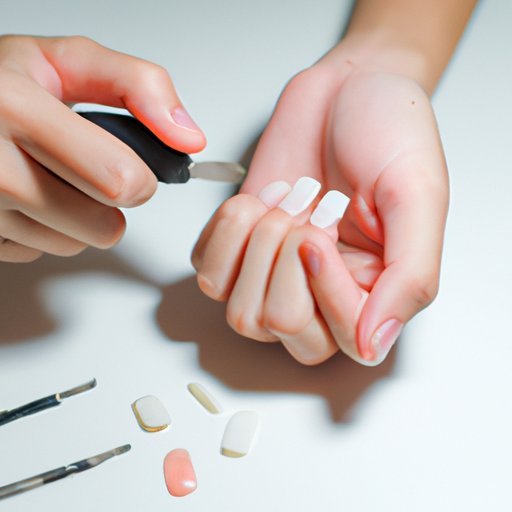Introduction
Split nails are a common problem, but they can be confusing and frustrating. Why do nails split? How can you prevent it from happening? This article will explore the causes of nail splitting and provide solutions for prevention and treatment.
Causes of Nail Splitting
Nails are made up of layers of a protein called keratin, and they are designed to protect the sensitive skin underneath. However, when nails split, it can be a sign that something is wrong. There are many reasons why nails may split, including:
- Dryness
- Injury
- Structural issues
- Underlying health conditions
Understanding how nail structure and function play a role in susceptibility to splitting can help you identify the cause of the problem and find a solution that works for you. Some people may be more prone to nail splitting than others, based on genetics, lifestyle, or environmental factors.
Nutritional Deficiencies that Cause Nail Splitting
Nutrition is a key factor in maintaining healthy nails, and deficiencies in certain nutrients can lead to nail splitting. Essential nutrients for nail health include:
- Protein
- Biotin
- Vitamin A
- Vitamin C
Protein is crucial for building strong nails, and biotin is a B vitamin that helps promote healthy keratin formation. Vitamins A and C are antioxidants that help protect nails from oxidative damage.
Biotin-rich foods include eggs, nuts, and avocados, while vitamin A can be found in carrots, sweet potatoes, and liver. Vitamin C is abundant in citrus fruits, berries, and peppers. Supplements may also be helpful, but it’s important to talk to your doctor before taking any new supplements.
Environmental Factors that Damage Your Nails
Many environmental factors can damage your nails, from common household products to temperature changes. For example, exposure to water and chemicals can weaken nails, as can extreme temperatures and humidity. Protecting your nails from these damaging factors can help prevent splitting.
If you’re dealing with nail splitting, it’s important to be aware of your environment and take steps to protect your nails. Avoid harsh chemicals, wear gloves when cleaning, and keep your nails moisturized with a non-greasy lotion.
Medical Conditions that Affect Nail Health
If you’re experiencing chronic nail splitting, it may be a sign of an underlying medical condition. Thyroid disease, psoriasis, and anemia are just a few examples of conditions that can cause nail problems. If you suspect a larger health issue may be causing your nails to split, it’s important to seek medical attention to get a proper diagnosis and treatment plan.
DIY Remedies for Split Nails
If you’re dealing with nail splitting, there are a variety of at-home remedies you can try. One simple solution is to keep your nails moisturized. Applying a non-greasy lotion to your nails and cuticles several times a day can help prevent dryness and splitting. You can also try soaking your nails in warm olive oil or coconut oil for a few minutes each day.
Another DIY remedy is to strengthen your nails with a nail hardener. Look for a product that contains ingredients like keratin, biotin, and vitamin E to help strengthen and protect your nails.
Professional Treatments for Nail Splitting
If at-home remedies aren’t enough to solve your nail splitting problem, you may want to consider professional treatments. A dermatologist or manicurist can help treat split nails with a variety of methods, depending on the underlying cause and severity of the problem.
One common treatment is to apply a nail wrap or artificial nail to protect the nail and promote growth. This can be especially helpful if your nails are weak or prone to breaking. Other options include topical medications, like antifungal creams, or oral medications, like antibiotics.
Preventing Future Nail Splitting
The best way to prevent future nail splitting is to take good care of your nails on a daily basis. This means keeping them clean and properly trimmed, moisturized, and protected from harsh chemicals and environments. It’s also a good idea to wear gloves when doing household chores or gardening to protect your nails from damage.
If you’re dealing with chronic nail splitting, it may be a sign of an underlying health issue or nutritional deficiency. By addressing these issues and making lifestyle adjustments, you can maintain healthy, strong nails.
Conclusion
Nail splitting can be a frustrating and even painful problem, but there are many solutions available. By understanding the causes of nail splitting and implementing preventive measures, you can maintain healthy, strong nails. If you’re dealing with chronic nail splitting, consider seeking medical attention to rule out any underlying health issues.
